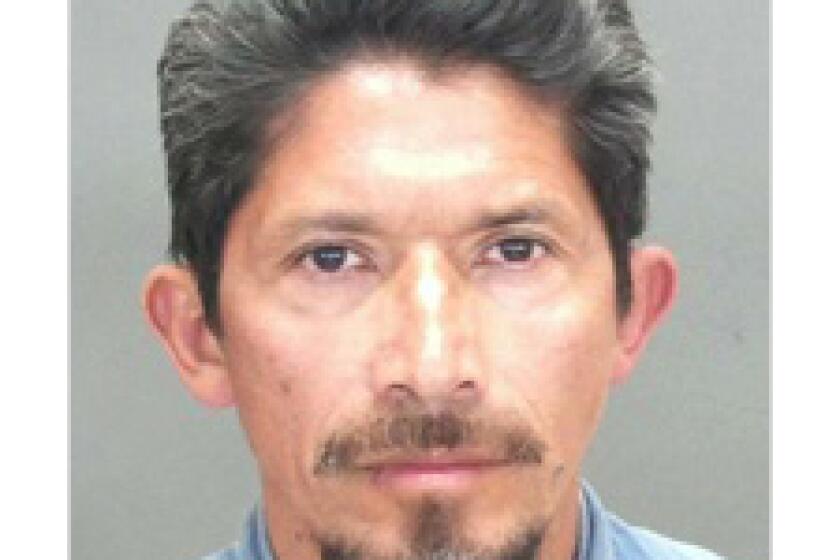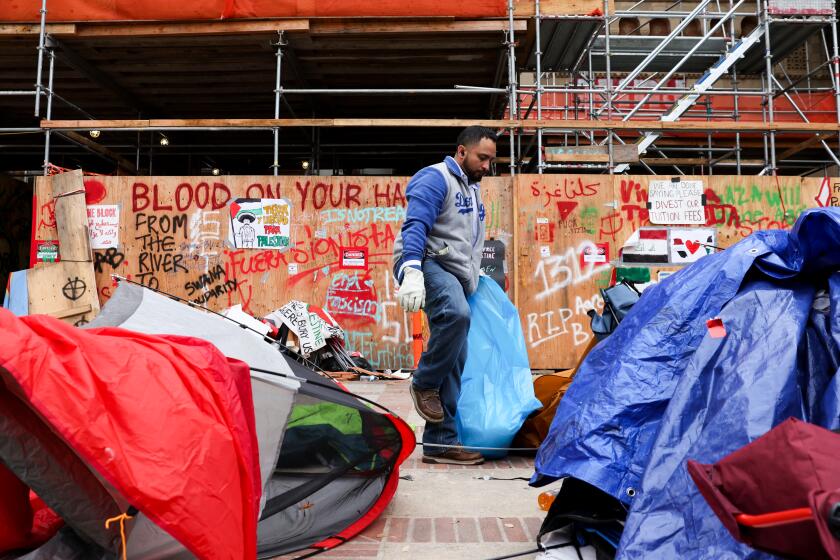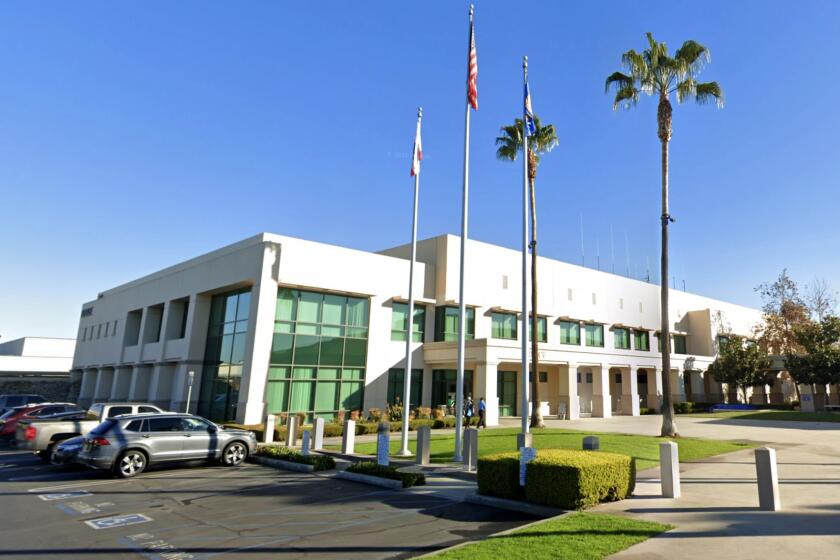Officer’s Star Searches Raise Liability Worries
For six years, Officer Kelly Chrisman used Los Angeles Police Department computers to look up confidential law enforcement records on celebrities and other high-profile people, including Sharon Stone, Courteney Cox Arquette, Sean Penn and Halle Berry.
Chrisman says he was just carrying out orders from superiors, but a lawsuit recently settled by the city for nearly $400,000 alleged that the officer had accessed the records to sell the information to tabloids.
Now Los Angeles officials are assessing the city’s potential liability.
According to internal LAPD documents, between 1994 and 2000 Chrisman tapped computer files on scores of celebrities, including Meg Ryan, Kobe Bryant, O.J. Simpson, Larry King, Drew Barrymore, Dionne Warwick, Farrah Fawcett, Cindy Crawford, Elle Macpherson and Berry Gordy.
The officer does not deny he looked up celebrities in police databases, but says department brass had ordered him to devise a locator map of Westside VIP residences. The LAPD maintains there was no such project and has filed misconduct charges that could result in Chrisman’s firing.
The 34-year-old officer has denied that he accessed computer records improperly.
The lawsuit, filed in federal court by Chrisman’s former girlfriend, said Chrisman had collected the data for financial gain, but LAPD investigators say they could not pin down a motive.
“We just don’t know,” said Deputy Chief James McMurray, until recently the chief of internal affairs. “There was all sorts of rumor and speculation.”Officials say unauthorized access alone violates department regulations, and no motive needs to be shown.
Whatever the motive, the case prompted worried debate during a closed session of the City Council on March 19, when council members voted unanimously to pay $387,500 to settle the lawsuit. According to sources, the council also directed its staff to study the liability the city might face as a result of unauthorized computer use by Chrisman or possibly by other officers.
The suit by Cyndy Truhan, ex-wife of former Dodger Steve Garvey, alleged that Chrisman had violated her privacy by using LAPD computers to secretly investigate her, as well as hundreds of other people, and that he had made a significant side income by selling the information to tabloids. In settling the suit, the city admitted no wrongdoing by Chrisman or the LAPD.
Councilman Dennis Zine said he and other council members found the Chrisman case disturbing and are concerned that the city might be at risk for more legal action. The LAPD has no monitoring system to detect unauthorized computer use, officials said.
“How many other situations do we have like this?” Zine asked. “How does this go unchecked? We’re spending almost $400,000 of taxpayer money on this one suit, and God knows how many more will come down the line.”
Zine, who was a police officer for more than 30 years, said council members had held a long discussion in closed session. “This wasn’t a case of, ‘Let’s pass this and thank you very much.’ I had some serious questions and my colleagues joined me in those questions,” he said.
Chief William J. Bratton, who took office in October, declined to be interviewed about the Chrisman case and the issues Zine raised. As soon as he learned of the case, Bratton placed Chrisman on home duty, similar to paid leave, until the charges are resolved. Department officials would not comment on why Chrisman had not been placed on leave earlier.
Chrisman no longer has computer access to confidential records. LAPD officials canceled his password for logging onto the system shortly after the investigation began.
Much of Chrisman’s alleged activity and the resulting investigation occurred while Bernard Parks was chief, from 1997 to 2002. Parks, now a city councilman, also refused to comment.
Chrisman’s attorney, Christopher A. Darden, rejected any suggestion that his client, a 13-year LAPD veteran, had made money as a news tipster by mining law enforcement databases. “There’s really nothing in those records to sell to tabloids,” Darden said. “He didn’t do it. That’s that.”
*
Trove of Information
LAPD computers are used to call up a variety of data, including addresses, criminal histories, birth dates, driving records, ownership of vehicles, physical descriptions, Social Security numbers, restraining orders and, in some cases, unlisted phone numbers.
The information is stored in state Department of Justice databases, which hook into a U.S. Department of Justice information network that allows users to obtain records in other states.
Federal and state laws, as well as LAPD regulations, permit access to the data for duty-related reasons only. Each time an LAPD user logs on, a warning reminds the user that a violation can result in criminal prosecution. Unauthorized use can also bring job penalties ranging from a reprimand to dismissal.
“We take violations very seriously. An officer isn’t even allowed to” run a computer check on himself, said Mike Van Winkle, a state Department of Justice spokesman.
Police apparently became aware of Chrisman’s computer activity only by accident.
In March 2000, Truhan called the LAPD to accuse Chrisman of coming to her home and roughing her up in a dispute related to their recently ended three-year relationship. The case did not result in criminal charges, but it set off an internal affairs investigation of Chrisman’s activities on and off duty.
In her suit, Truhan said Chrisman had “used his position as an officer to find her new telephone numbers and addresses” and to stalk her after she had broken off the relationship.
While they were still dating, according to the suit, Chrisman had told her that he could plant unflattering stories about her in tabloids and had threatened her with bodily harm if she told anyone that he was making money as a tipster for the National Enquirer and other publications.
Sources said phone records obtained by the LAPD show numerous calls from Chrisman to Cindy Solomon, a Los Angeles-based senior reporter for the National Enquirer. Solomon declined to say whether she knows the officer. “I know where you’re going with this and I can’t comment,” she said.
Enquirer Editor David Perel acknowledged that his paper pays some sources, but said his reporters do not buy information from police officers. Major newspapers, including the Los Angeles Times, prohibit reporters from paying sources for information.
LAPD investigators sought to prosecute Chrisman in April 2001. But the district attorney’s office declined to file charges because a one-year statute of limitations had expired, said James Cosper, head of the district attorney’s justice integrity unit.
Darden turned down a request for an interview with his client, saying the officer is under orders from the LAPD not to discuss his case.
*
Celebrity Searches
An LAPD audit of Chrisman’s computer use showed “hundreds of hits” on prominent names, said a source familiar with the investigation. According to the source and internal documents, some names that popped up were Jennifer Aniston, Mickey Rourke, Pamela Anderson, Lara Flynn Boyle, Kim Delaney, Peter Horton, Dylan McDermott and Nicole Brown Simpson. Documents collected by investigators show that at least 30 times between 1996 and 2000, the officer also accessed files on Truhan, Garvey, Truhan’s two grown daughters, her ex-boyfriend and the boyfriend’s relatives.
Chrisman ran some of the names from his patrol-car computer and others from a desktop terminal in the West Los Angeles station where he worked.
When asked by the disciplinary board to explain why he had accessed celebrity files, Chrisman said he had been carrying out orders, according to hearing transcripts.
He recalled being assigned to a three-year celebrity mapping project in about 1995 while working in the West Los Angeles station’s crime analysis unit. His supervisors asked him to include, not only entertainment stars but Fortune 500 executives, dignitaries and other important people, he said.
“Names just came to mind that I researched,” he testified. “A lot of it, believe it or not,” came from a star map purchased off Sunset Boulevard.
Now-retired Lt. Frank Spangler told the hearing board that he had asked Chrisman in late 1995 to see if there was a way to create a computerized map that would give officers responding to emergencies a heads-up if high-profile people might be involved at certain Westside locations.
Spangler remembered Chrisman’s telling him about a year later that Chrisman had ended the project because the department’s mapping software wasn’t up to the task.
Several other supervising officers in the station, including the head of the crime analysis unit, told the board they knew of no mapping effort involving celebrities, according to hearing transcripts. Investigators searched boxes of files and found no evidence of a project like the one Chrisman described.
“We don’t have a system, nor should we have a system, to track celebrities,” McMurray, the former internal affairs chief, said in an interview.
The hearing board, according to transcripts, noted that Chrisman’s crime analysis stint had accounted for at most three of the six years during which he accessed celebrity files.
“I don’t understand why you were running these people,” Capt. James Rubert, the board chairman, told the officer. “You were in the police car.... And you are running people that ... aren’t a threat to the community, aren’t victims of crime, aren’t asking for your assistance -- going about their daily work like everybody else.”
“I wanted to know who lived in my area,” Chrisman replied. “If there is a potential problem, I could keep a list myself” of who is in the area, “and I did.”
Darden, who gained recognition as co-prosecutor in the O.J. Simpson murder trial, said it is unfair of the LAPD to ask Chrisman to explain something he did several years ago.
“They went through years of computer printouts and they asked him, ‘Why did you run that person?’ Well, how the heck would anyone remember back that far?” Darden said.
Chrisman’s case is being heard by a three-member disciplinary board that has held about 20 days of hearings, on and off, since 2001. Chrisman faces administrative charges accusing him of domestic violence against Truhan and of misusing LAPD computers. The next hearing is set for April 15.
More to Read
Start your day right
Sign up for Essential California for news, features and recommendations from the L.A. Times and beyond in your inbox six days a week.
You may occasionally receive promotional content from the Los Angeles Times.






